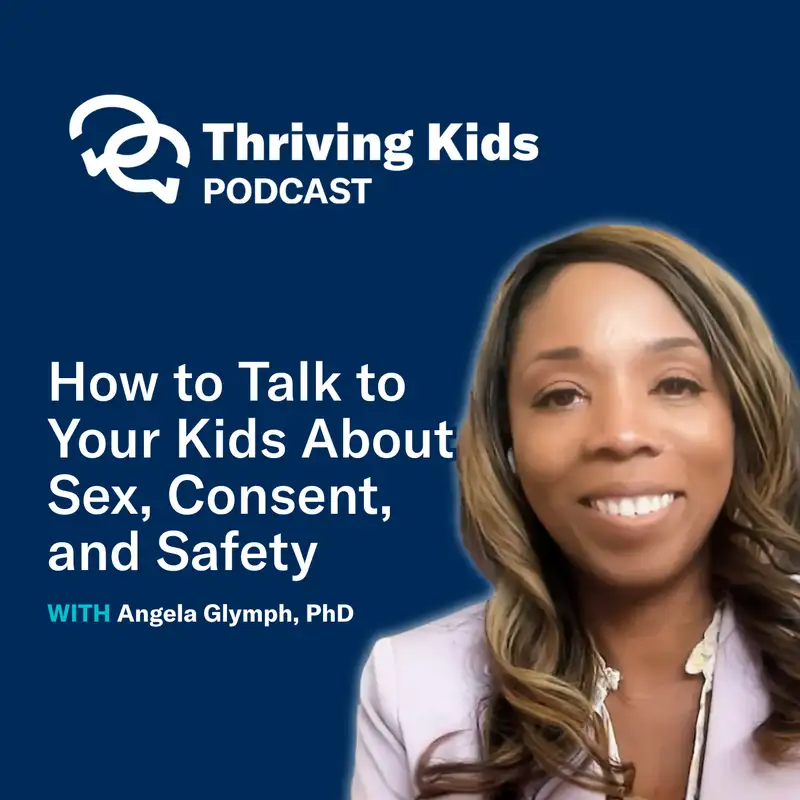How (and When) to Talk to Your Kids About Sex, Consent, and Safety
Talking to kids about sex, consent, and safety can feel intimidating — or like something you’d rather put off. But kids are already getting information from somewhere, and it’s not always accurate or safe. In this episode of Thriving Kids, clinical psychologist and host Dr. Dave Anderson talks with Dr. Angela Glymph, CEO of Peer Health Exchange, about how to have honest, age-appropriate conversations that protect kids, affirm who they are, and strengthen your relationship with them.
They break down what “comprehensive sex education” really means, how to start early with body autonomy and consent, and how to keep the conversation going through elementary school, middle school, and the teen years — without needing to be a “perfect” expert.
Guest
Dr. Angela Glymph is the CEO of Peer Health Exchange, a national youth nonprofit dedicated to helping young people stay safe, healthy, and affirmed — no matter who they are or where they live. Her work centers adolescent health equity, social-emotional learning, and youth-led, inclusive health education. She’s also a parent, navigating these conversations at home herself.
In this episode, we discuss:
- What comprehensive sex education actually includes (it’s more than just “the talk”)
- Why medically accurate, truthful information keeps kids safer
- How kids really learn about sex, consent, and relationships (school, peers, online, social media)
- The benefits of giving kids good information vs. leaving them to “figure it out”
- How to teach body autonomy and consent starting in early childhood
- Why using correct terms (like vulva, penis, sperm, egg) matters
- How to build on the conversation in elementary school, middle school, and beyond
- When and how to talk about contraception, STIs, and safety
- Why abstinence can be part of the conversation — but not the whole thing
- How to respond if your teen is already sexually active
- What to do if you feel too awkward or underqualified to have these talks
- The myth that teens don’t want to talk to parents about sex (and why it’s wrong)
Age-by-age: Laying the groundwork
- Ages 3–5 (early childhood)
- Simple yes/no and body boundaries
- Naming body parts accurately (including genitals)
- Basic explanation of where babies come from using truthful, simple language (e.g., sperm and egg)
- Ages 6–8 (early elementary)
- Building on earlier explanations with more biology
- Talking about different family structures and ways babies come into families
- Normalizing questions and curiosity
- Ages 9–11 (upper elementary)
- Puberty: what’s happening in their changing bodies
- Factual explanation of sexual intercourse and pregnancy in developmentally appropriate terms
- Introducing contraception and safety basics
- Reinforcing body autonomy and boundaries
- Ages 12+ (middle & high school)
- Relationships, identity, and decision-making
- More detailed conversations about contraception, STIs, and safer sex
- Consent in the context of romantic and sexual experiences
- How to think about risks, pressure, and personal values
Key takeaways for parents
- If kids don’t get information from you or other trusted adults, they will seek it elsewhere — online, from peers, or pornography.
- Comprehensive sex education is lifesaving: it helps prevent unintended pregnancy, STIs, and sexual violence, and it builds communication skills kids use far beyond this topic.
- Using medically accurate terms normalizes the conversation and gives kids language to advocate for themselves and report if something is wrong.
- Abstinence is a valid choice and part of comprehensive education — but it shouldn’t be the entire message.
- You don’t have to do this alone: your pediatrician, your child’s school, faith community, and trusted adults (like an aunt/uncle or family friend) can all help.
- Teens may act like they don’t want to talk to you, but many do want open, nonjudgmental conversations — they’re also trying to figure out how to approach you.
Resources mentioned in the episode
Books for kids & families
- Cory Silverberg – books about bodies, reproduction, and growing up (including What Makes a Baby and later titles for older kids and teens)
- Megan Madison – Being You and Yes! No! (early childhood books covering gender, consent, and body autonomy)
Organizations & platforms
- Peer Health Exchange – comprehensive, inclusive, peer-led health education
- Selfsea (selfsea.org) – Peer Health Exchange’s digital platform created with and for young people, including stories and resources on sex, consent, and talking to parents
- Planned Parenthood – education and resources for teens and parents on sexual and reproductive health
Further reading
- Talk to Your Kids About Sex and Healthy Relationships – health.gov
- https://odphp.health.gov/myhealthfinder/healthy-living/sexual-health/talk-your-kids-about-sex-and-healthy-relationships
- The Best Sex Education Books for Kids of All Ages (And Their Parents!) – Healthy Children / AAP
- https://www.parents.com/kids/health/best-sex-education-books-for-kids-by-age/
- How to Talk to Kids About Sex and Boundaries – Child Mind Institute
- https://childmind.org/article/how-talk-kids-sex-consent-boundaries/
- How to Talk to Your Kids About Porn – TIME
- https://time.com/4277188/how-to-talk-to-your-kids-about-porn/
About Thriving Kids
Thriving Kids is a podcast from the Child Mind Institute that helps you raise emotionally healthy children with practical, expert-backed advice.
Creators and Guests

Host
Dave Anderson
Dave Anderson, PhD, is the Vice-President of Public Engagement and Education and a senior psychologist in the ADHD and Behavior Disorders Center at the Child Mind Institute. Dr. Anderson focuses on the expansion of our awareness-building and prevention programs while also leading initiatives that build the Child Mind Institute brand, foster strategic partnerships, and forge new relationships with policy makers and youth mental health leaders.
Producer
Andrew Dearling
Andrew Dearling is the Digital Director at the Child Mind Institute, where he leads strategy and execution across web, email, social media, and digital campaigns. He focuses on using digital tools to connect more families with mental health resources, expand the organization’s reach, and drive measurable impact. Andrew combines deep expertise in content, platforms, and performance marketing with a clear understanding of how to reach people where they are, and move them to take action.

Producer
Chad Garber
Chad Garber, a seasoned Creative Producer with over 15 years of experience, shapes branded video, digital, and experiential content for Fortune 100 companies, agencies, and in-house teams to Child Mind Institute. Known for building high-performing creative operations, he led pro-bono productions to multimillion-dollar campaigns for brands like Verizon, Microsoft, New Balance, Budweiser, and FedEx. His sharp storytelling, deep production expertise, and collaborative leadership move ideas from concept to screen with impact.

